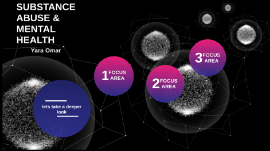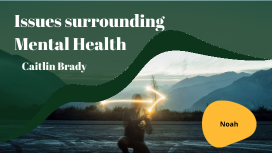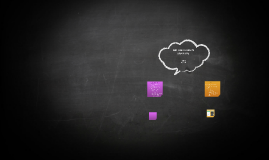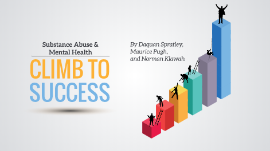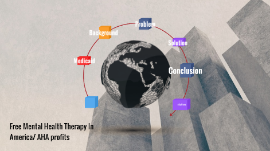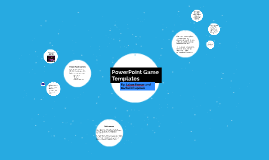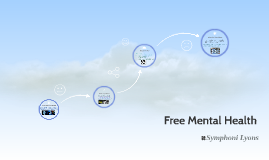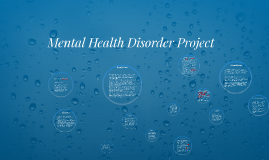substance abuse & mental health
Transcript: Yara Omar SUBSTANCE ABUSE & MENTAL HEALTH lets take a deeper look lets take a deeper look definitions S W O T mental health Mental Health "a person’s condition with regard to their psychological and emotional well-being." substance abuse Substance Abuse "overindulgence in or dependence on an addictive substance, especially alcohol or drugs." Is it that serious? serious matter. Disorders, which in this case include both the mental health issue and the drug or alcohol addiction have their own unique symptoms that may get in the way of your ability to function at work or school, maintain a stable home life, handle life’s difficulties, and relate to others. FOCUS AREA 1 MENTAL HEALTH 1 THE PROBLEM THE PROBLEM Roughly more than 300 million people, so that would be around 4.4% of the world’s population that suffer from depression. It is estimated that mental health conditions will affect one in four people during sometime in their lives. We are taught in school or by our families about diseases and issues whether its regarding sexual health or something else, but we are not taught about something that can consume a whole human without the proper help. Disparities abound, both between countries and particular groups. It is scandalous that 35-50% of people with severe mental health disorders in the Global North receive no therapy; but that figure roughly doubles to 76-85% for people living in the South. There are many different mental disorders, with different presentations. They are generally characterized by a combination of abnormal thoughts, perceptions, emotions, behaviour and relationships with others. DEEPER LOOK INTO ONE FOCUS ON ONE Depression is the most common mental disorder and one of the main causes of individuals being unable to function worldwide. Depression is characterized by sadness, loss of interest or pleasure, feelings of guilt or low self-worth, disturbed sleep or appetite, tiredness, and poor concentration. People with depression may also have multiple physical complaints with no apparent physical cause. Depression can be long-lasting or recurrent, substantially impairing people’s ability to function at work or school and to cope with daily life. At its most severe, depression can lead to suicide. There are also effective treatments. Mild to moderate depression can be effectively treated with talking therapies, such as cognitive behaviour therapy or psychotherapy. Antidepressants can be an effective form of treatment for moderate to severe depression but are not the first line of treatment for cases of mild depression. They should not be used for treating depression in children and are not the first line of treatment in adolescents, among whom they should be used with caution. STIGMAS SURROUNDING MENTAL HEALTH STIGMAS The Stigma of Mental Illness “Stigma refers to a cluster of negative attitudes and beliefs that motivate the general public to fear, reject, avoid and discriminate against people with mental illnesses." EXAMPLES 1. People should work out their own mental health problems. 2. Females are more likely to have a mental illness than are males. 3. Drug use is the main cause of mental health issues. FOCUS AREA 2 SUBSTANCE ABUSE 2 THE PROBLEM THE PROBLEM Drug addiction is a chronically relapsing disorder that has been characterized by the compulsive use of addictive substances despite adverse consequences to the individual and society Many people use drugs as a diversion from their reality. Drug abuse does not necessarily correspond to how wealthy or poor one is. When a mental health problem goes untreated, the substance abuse problem usually gets worse. Substance abuse affects millions of people worldwide each year. It is estimated that about 76.3 million people struggle with alcohol use disorders contributing to 1.8 million deaths per year. As is the case with some global issues, substance abuse is unfairly portrayed – the developing world, marginalized groups, and communities being the most vulnerable to this reality. The most generally mentioned drugs were marijuana, cocaine, alcohol, Amphetamine-type stimulants (ATS), opiates and volatile solvents. While in some cases people are brought up in homes where they are exposed to drugs and a negative type of lifestyle, that is not always the case of why people fall down the path of substance abuse. DRUG SUBTOPIC Prescription Drugs Almost everyone has gotten a prescription filled at least one time, and what people don't realize is some of those medications we get prescribed are potentially addictive and can be dangerous if taken inappropriately. Some prescriptions are abused in this day and age, rather than actually being used to help. In some cases, especially in the United States; legal drugs can kill more people than illegal drugs. The initiation of the use of these substances induces euphoria, reward and a state of well-being that can lead to physical and psychological dependencies. Withdrawal syndrome occurs when the individual attempts






